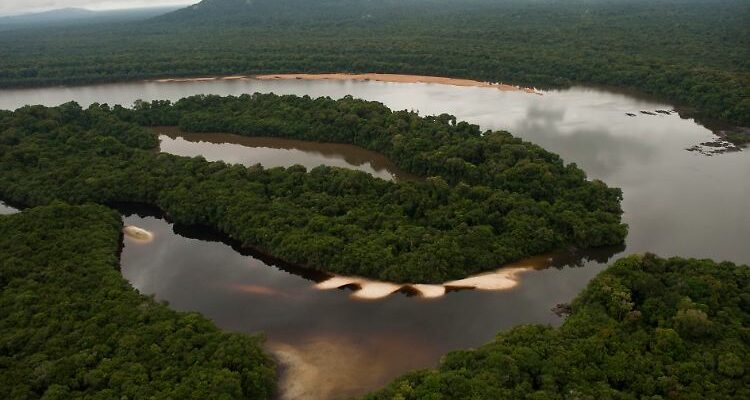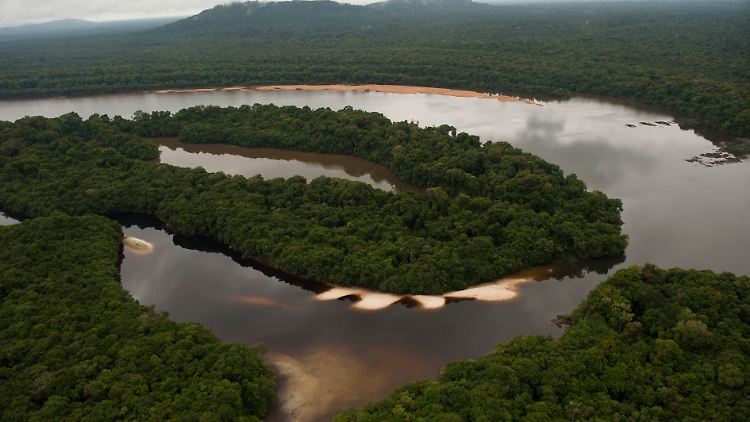After Venezuela’s saber rattling
Jungle war in Guyana? “That would be Vietnam to the power of three.”
By Kevin Schulte
December 19, 2023, 7:36 p.m
Listen to article
This audio version was artificially generated. More info | Send feedback
After Venezuela’s annexation referendum, the world feared the next war, but the situation has now calmed down. A battle in the rainforest would be impossible for anyone to win anyway, says a local expert.
Memories of Russia and the annexation of Crimea nine years ago are brought back as Venezuelan President Nicolás Maduro celebrates the results of a bizarre referendum two weeks ago. Venezuela thus claims ownership of most of its neighboring country Guyana. In the referendum, 95 percent voted for Venezuela to annex the Essequibo region of Guyana.
President Maduro speaks of a victory for his country. The Venezuelan people “spoke hard, loudly and clearly.” That is why we are now “entering a new, powerful phase”. Venezuela’s president is calling for the area to be made a province of Venezuela by law and for oil production licenses to be issued.
Guyana, on the other hand, denounces the vote as an “existential threat.” The country in northern South America is one of the smallest on the continent – but not tiny by European standards, just slightly smaller than Great Britain. But Venezuela lays claim to almost two-thirds of the country’s territory – a region roughly twice the size of Austria.
“The region is not called Eldorado for fun”
The Essequibo region extends from the Atlantic coast in northwest Guyana to deep south on the border with Brazil. A very resource-rich area, white Christian Cwik, historian at the University of Graz at the Center for Inter-American Studies. The Austrian is well connected in South America and has conducted research in the region for years. “It’s of course about the new natural gas and oil discoveries off the coast of Guyana. But in reality it’s also about diamonds, about gold, about bauxite, about uranium. These raw materials are all hidden in the region, which is not called Eldorado for fun “, reports the expert in the ntv podcast “Learned something again”.
Venezuela and Guyana are “in constant dispute” over Essequibo, says Cwik. “On virtually all Venezuelan maps this is marked as a claimed area.” Nobody in the region itself was surprised by Venezuela’s move.
“There is no rougher terrain”
After a good two weeks of verbal saber rattling, things have now calmed down again. Last week, Presidents Maduro and Irfaan Ali met on neutral ground in the Caribbean country of St. Vincent and the Grenadines. Afterwards, a joint statement said that violence must be avoided and that the conflict should be resolved in accordance with international law. Venezuela and Guyana also want to set up a commission.
This all sounds as if the conflict is freezing up again. Local experts like Christian Cwik are not surprised by this. The Austrian had already made it clear in advance that he considered military deployment to be very unlikely. Conquering the rainforest-rich El Dorado is “actually impossible,” said Cwik in the podcast. “It is a very dense and partly primary rainforest. There is no terrain more impassable than this area.”
“Venezuela’s perspective is not entirely wrong”
Venezuela derives its claim to Essequibo from the 1966 Geneva Convention. At that time, Venezuela and Great Britain signed a border treaty – immediately before the former British colony of Guyana declared independence.
An agreement from 1899 had previously applied. In the years that followed, Venezuela accused the court of having made a biased decision in favor of British Guiana. London and Caracas annulled the 1899 agreement with the Geneva Convention. “From a neutral perspective, this is already a controversial question. Venezuela’s perspective is not entirely wrong. There is, frankly, a lot of mischief that has been done on the part of the British. They have tried to expand the territory as much as possible in their favor “, analyzes Cwik on “Learned something again”.
Ultimately, the Geneva Agreement from the 1960s did not provide a promising solution. The border dispute was frozen a few years later.
Economic and domestic political reasons
Venezuela’s perspective on the arbitration may not be entirely wrong, says Cwik. Apart from agreements that are over 100 years old, which Caracas is upset about, Venezuela’s actions primarily have an economic background. In 2015, huge reserves of oil were found off Guyana’s Atlantic coast. Since then, Guyana has become the country with the fastest economic growth in the world. Venezuela’s state-owned oil company has – unsurprisingly – not received any mining rights and Caracas also feels “challenged because of this,” analyzes Cwik.
The annexation referendum was not only intended to strengthen Venezuela’s position vis-à-vis Guyana. Maduro is also concerned with improving his domestic political situation, Guyana’s Prime Minister Mark Philipps said in a statement “World” interview. The ruler had “reached the lowest point of his popularity” and therefore he was “looking for a way to get people back on his side.” Create an enemy of the people? Instructions for this should be on one of the first pages of every autocrat handbook.
USA could intervene
Guyana’s President Ali said after the annexation referendum that his country was preparing “for the worst-case scenario.” The government of Guyana has therefore primarily increased its contacts with the USA, reports political scientist Aaron Tauss from the University of Vienna at ntv. “The Guyanese vice president has said that all options are on the table and under no circumstances will Guyanese allow Venezuela to annex this territory.”
The US military deployed its air force over Guyana a few days after the referendum to underline its support for the country. This measure may have played a part in averting an escalation for the time being.
Should Venezuela one day, contrary to expectations, decide to make a military advance, the United States would come back into play. “I can well imagine that the USA is willing to defend its interests, as it has often done in Latin America, even to the point of military intervention. But Great Britain would of course also like to carry out some kind of protective power function,” analyzes Cwik in the podcast. “But it’s about pure jungle warfare. That’s Vietnam to the power of three. I doubt whether anyone would actually go in there.”
“Learned something again” is a podcast for those who are curious: Why would a ceasefire probably just be a break for Vladimir Putin? Why does NATO fear the Suwalki Gap? Why does Russia have iPhones again? What small behavioral changes can save 15 percent energy? Listen in and get a little smarter three times a week.
You can find all episodes in the ntv app RTL+, Amazon Music, Apple Podcasts and Spotify. For all other podcast apps you can use the RSS feed.
You have a question? Please send us an email to [email protected]

